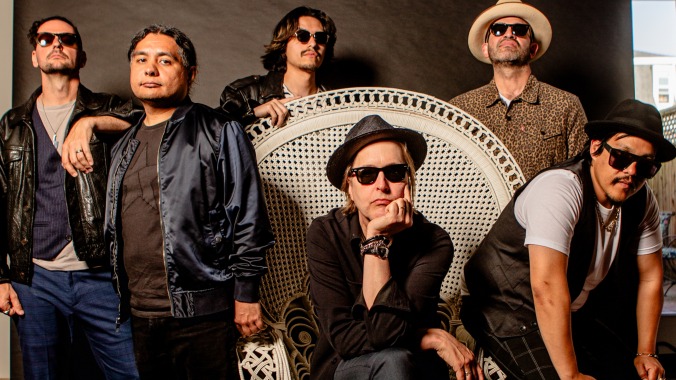Cumbia Wave Catches Chuck Prophet as Style Reaches an American Audience
A revival in Bogotá of the traditional Colombian rhythm is part of a música tropical movement bringing bands to the United States, and influencing rock ’n’ roll veterans.
Photo by Kory Thibeault
Chuck Prophet remembers the day he started listening to cumbia, the Latin American musical style that forms the backbone of his new album Wake the Dead.
It was probably 10 years ago, and Prophet was playing a gig at the Make Out Room, a club in his neighborhood in San Francisco, with a bunch of special guests who were in town for the annual Hardly Strictly Bluegrass Festival. The venue was full, the band was cooking and everybody was having a good time through the end of the show—right at 9 PM, the deadline Prophet always seemed to run up against when he played there. “It’s like, come on, guys, we’re packing this place, the bartenders are making money—what’s the problem?” Prophet says in his bemused drawl. “They’re like, ‘Yeah, well, it’s cumbia night.’”
After Prophet and his band packed up their gear and settled into the club’s Naugahyde booths, a DJ started playing cumbia records and a new crowd began to gather as the distinctive repeating basslines rattled through subwoofers. Before long, his drummer, Vicente Rodriguez, was teaching basic dance steps to Stephanie Finch, Prophet’s wife and bandmate, and the evening seemed to blossom in a different way. “I was like, ‘Oh, man, this is fucking cool. I want this night to go on forever,’” says Prophet, who liked what he heard so much that he became a regular at cumbia night and began collecting vinyl from Latin America.
The roots-rock veteran spent much of the initial COVID-19 lockdown listening to cumbia, a style that originated in Colombia and spawned regional variants across Latin America. In addition to his growing collection of cumbia records, Prophet went online to watch videos of cumbia acts from the ’60s and ’70s, when performers from Peru and other places blended the traditional “tune-ticka-tune” rhythm with psychedelia, surf rock and other more modern touches. When Prophet was diagnosed with stage 4 lymphoma in 2022, the music took on new significance for him. “It saved me, because it helped me to get out of my head,” says Prophet, who started writing his own cumbia-style songs.
As COVID restrictions eased, Prophet’s manager tipped him to ¿Qiensave?, a quintet from Salinas, a few hours south of San Francisco (the name is a play on the Spanish phrase “quién sabe,” or “who knows?”). Prophet got to know the group, which draws on Mexican cumbia, and started jamming with them, often stopping in Santa Cruz to surf on his way to Salinas. “I did a lot of that when I was going through chemo, because as bad as chemo was, I still had a couple weeks of the month where I felt pretty good,” says Prophet, whose cancer is now in remission. “At first, they learned some of my songs, and they were so, like, upside down, I couldn’t relate. And then I tried to teach them an Eddie Cochran song, and then eventually it just started clicking.”
Playing together led to a couple of gigs, and then Prophet brought ¿Qiensave? into the studio with some members of his band, the Mission Express, to make Wake the Dead, a collection of 11 songs. Most of them feature that trademark cumbia rhythm, accompanied by drums, percussion and accordion, along with guitars and vocals. Prophet deviated from typical cumbia song structure, but there’s no mistaking the influence. “I’m definitely a classicist, so I like choruses and shit like that,” says Prophet, who got his start in the ’80s playing guitar in the country-leaning indie-rockers Green on Red before turning to a solo career in 1990. “A lot of the cumbia stuff is just one chord—but nobody’s bored.”
Prophet’s foray into cumbia comes as the style grows in visibility in the United States, spurred in part by an ongoing cumbia renaissance in Bogotá, Colombia. This year has brought Colombian groups to the U.S. on tour, some for the first time, as well as new music from acts including the Meridian Brothers, whose sprawling, experimental album Mi Latinoamérica Sufre came out in July; and La Sonora Mazurén, which released the fiercely rhythmic Magnetismo Anímal earlier this month. Those groups often fuse cumbia with other sounds in what’s broadly known as música tropical—a catch-all term for music that developed in Spanish-speaking areas of the Caribbean through close contact among enslaved Africans, indigenous communities and Spanish colonizers.
“This blending is very interesting for the whole 20th century,” says Eblis Álvarez, leader of the Meridian Brothers. “If there’s a universal culture of music, it’s this African diaspora, because from this seed comes all the styles: New Orleans, the blues, Cuba and all its lines of development, then the music of the Colombian and Venezuelan coasts.”
-

-

-

-

-

-

-

-

-

-

-

-

-

-

-

-

-

-

-

-

-

-

-

-

-

-

-

-

-

-

-

-

-

-

-

-

-

-

-

-








































